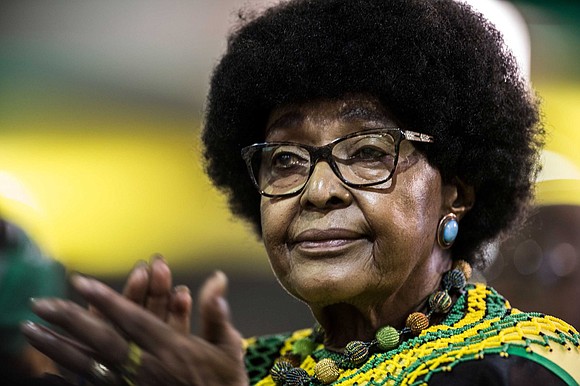Winnie Madikizela-Mandela reveals South Africa's uncomfortable truths
CNN/Stylemagazine.com Newswire | 4/3/2018, 3:44 p.m.

By Kevin Bloom
(CNN) -- In 2010, when Alice Walker was in South Africa to deliver the annual Steve Biko Memorial Lecture, I was invited to interview the great American writer. It was Walker's first visit to the country, and for reasons I could not fathom at the time, the director of the Steve Biko Foundation presented me with a list of subjects that were off-limits. Top of the list was Winnie Madikizela-Mandela.
"Why not Winnie?" I asked, aware that the author of "The Color Purple" had forged a bond with South Africa's "Mother of the Nation" that stretched back many years.
Because those are the rules, said the director, or something to that effect.
Madikizela-Mandela, former wife of famed anti-apartheid leader and later South African president Nelson Mandela -- and an anti-apartheid icon in her own right -- was a complex figure. In the end, what she came to represent for the liberation movement to which she dedicated her life was its unvarnished and even more uncomfortable truths.
As it turned out, the answer to my question as to why Madikizela-Mandela was off-limits was contained in an essay that Walker had composed in 1991. Titled "How Long Shall They Torture Our Mothers?" the piece dealt with the death in January 1989 of 14-year-old black South African activist Stompie Seipei -- and specifically, with Madikizela-Mandela's subsequent conviction by a South African court for the kidnap and assault of Seipei.
Seipei was suspected of acting as a police informer, which would have been seen as a betrayal to the liberation struggle. Though Madikizela-Mandela claimed she was taking the young boy away from an abusive situation, she was sentenced to six years.
Walker was adamant that Madikizela-Mandela had been set up. "What to make of this," she wrote, "except to recognize that the courtroom and press, as instruments of a white supremacist, fascist state, are merely the continuation of torture by other means."
Six years later, at the Truth and Reconciliation Commission (TRC), the hearings set up by the South African state to deal with the historical injustices of apartheid, Madikizela-Mandela acceded to the pleas of liberation icon Desmond Tutu and admitted to the nation and the world that "things went horribly wrong" on that January day in 1989. In the TRC's final report, she was held "politically and morally accountable" for the human rights violations that resulted in Seipei's death. The commission judged that she was "implicated" in the murder, and that she allowed her home to be used as a place for assault and mutilation.
While Madikizela-Mandela never served time in prison for the incident -- her sentence was reduced to a fine -- it would stain her reputation for the rest of her life.
But, on the day of her passing, it is worth remembering that the Seipei saga -- perhaps more than any other event before or since -- exposed the deep hypocrisy at the heart of the "new" South African state. The hypocrisy is this: in democratic South Africa, whites would continue to get away with murder.
Because, although she grudgingly acknowledged the wrongdoing, Madikizela-Mandela refused to offer the "full truth" to the TRC -- and it was this fact, not the fact that former apartheid president P.W. Botha refused to even testify, that doomed the commission to failure. Consequently, in 2018, we have a situation in South Africa where only two people have served jail time for the crime against humanity known as apartheid.
In 2008, it was revealed that senior members of the ruling African National Congress (ANC) had ordered the country's chief prosecutor not to put apartheid-era security policemen on the stand. Why? Because these men knew -- and could publicly divulge -- the darkest secrets of the ANC, secrets in which the likes of Madikizela-Mandela might be intimately involved.
In any war, of course, atrocities are committed by both sides. But Madikizela-Mandela, who was hounded and harassed by the apartheid police for three decades, would remain unrepentant about this reality to the end.
"(Nelson) Mandela let us down," she told a UK newspaper in 2010. "He agreed to a bad deal for the blacks."
Was Walker aware of these subtleties when she visited South Africa for the first time eight years ago? Probably not. In her writings on the "Mother of the Nation," she remained intent on lionizing the woman; no acknowledgment was ever forthcoming that Madikizela-Mandela may have borne any responsibility for the death of a 14-year-old boy.
But there was one thing that Walker did get right. In her poem "Winnie Mandela: We Love You," she referred to her heroine as "Lucy."
This, she explained, was the name given by paleoanthropologists to the fossilized skeleton of the most ancient, recognizably human figure ever found -- "a female being who lived on the African continent some three million years ago." What Walker was suggesting was that Madikizela-Mandela was as much "of" Africa as this enigmatic, matriarchal First Lady.




